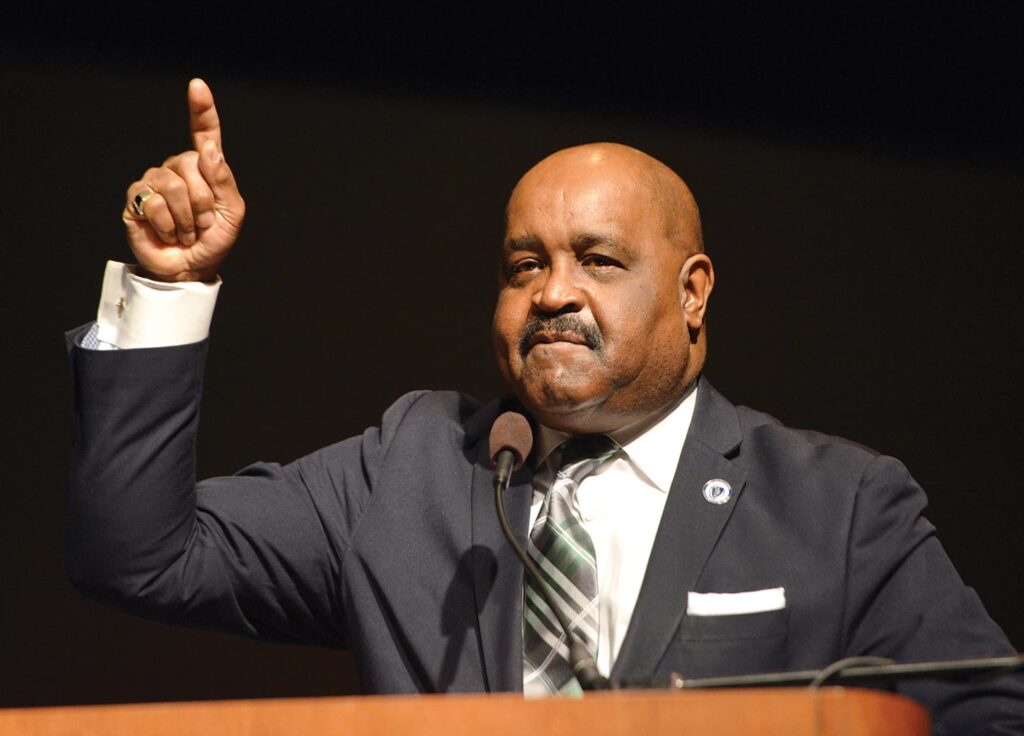Mass. Black and Latino Caucus proposes new spending
Chair secures $40M in additional state funding

Members of the Massachusetts Black and Latino Legislative Caucus last month proposed an additional $419.3 million in spending to the House budget for next year. They secured $40.6 million.
A 9.7% success rate at work would worry most professionals, but in political calculus, it amounts to a surplus of talking points, at least for a while. Every hard-fought dollar in the House budget remains subject to deletion later when a secretive committee meets to reconcile that spending plan with the state Senate’s budget, which is scheduled to be debated this month.
The chair of the Black and Latino Caucus, Rep. Bud Williams of Springfield, asked for the most of any caucus member: $235.6 million. A single amendment made up most of the experienced legislator’s proposed spending: about $200 million for MassDREAMS. The program funded by federal Covid relief covers down payments for disadvantaged first-time homebuyers.
Williams’ amendment was not voted on directly in the House in April, but was consolidated with many others.
Consolidated amendments spare Beacon Hill’s members from casting tough votes that could get them in political trouble. Instead, hundreds of amendments are approved at once. If included, many proposed spending amounts are halved or worse. Other amendments are omitted from the package.
Funding proposed in Williams’ 38 budget amendments was overwhelmingly left out. Just $1 out of every $500 he proposed was included, the lowest ratio of any caucus member. His 11 successful amendments included, besides the homebuying program, $435,000, mostly for youth programs, community services, veterans groups and cultural events in Springfield.
Boston’s five caucus members secured only 6.8% of their proposed spending. Rep. Chris Worrell of Dorchester offered the largest successful amendment of the group, $1 million for the New Commonwealth Fund, which makes grants to minority-led nonprofits.
Beyond that, $500,000 was appropriated to the Black Economic Council of Massachusetts. Two representatives filed amendments for that funding, Brandy Fluker Oakley and Russell Holmes, both from Mattapan.
In her second term, Fluker Oakley is well-positioned for a future in House leadership. She sits on powerful committees — Judiciary and Transportation. She is also vice chair of Beacon Hill’s Racial Equity Committee.
Already, she was able to sway the House to adopt earmarks for Boston’s Big Sister Association, the Massachusetts Sickle Cell Disease Association and Harbor Health Services, which operates the Geiger-Gibson and Neponset health centers in Dorchester.
Filing 31 amendments — more than double the number most caucus members submitted — Roxbury Rep. Chynah Tyler won the debate over five. The House budget contains $700,000 she directed toward Dimock Health Center, Warren Gardens tenants, the Nathan Hale school, Nubian Square Foundation and the Urban League of Eastern Massachusetts.
Lagging the caucus by both absolute and proportional measures was Jamaica Plain Rep. Samantha Montaño. Of her 18 amendments to the House Ways and Means Committee’s draft budget, only two survived consolidation. They total $70,000, to be split between the Hyde Square Task Force and her district’s Main Streets organizations.
In percentage terms, the caucus’ most effective budget advocate was Rep. Frank Moran from Lawrence. Proposing $48.8 million in amendments, Moran’s were consolidated into $33.2 million of spending. Overall, $340 of every $500 Moran’s proposed spending was adopted by the House. Of his 23 filings, 17 were included by consolidation in some form.
The biggest haul was $30 million more for hospitals with high rates of MassHealth patients. Another multimillion-dollar amendment by Moran increased reimbursement rates to municipalities hosting Commonwealth Charter schools by about 10%.
Some freshman members of the caucus were similarly effective, while pushing more modest spending proposals.
Rep. Manny Cruz from Salem had five of his six amendments adopted, although often in diminished forms. Rep. Estela Reyes of Lawrence got four of her five amendments in.
Other caucus members moved money towards their priorities in the House debate, notably Reps. Carlos González of Springfield, Andres Vargas of Haverhill and Kip Diggs from Cape Cod.
Most caucus amendments this year were direct appropriations for funding. Of 14 amendments to the budget’s policy language, only two made the House’s last draft.






